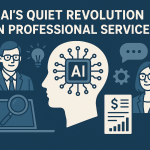Why Service Literacy Belongs in Schools
Kids today know all about influencers and YouTubers — but how many can explain what a plumber, logistics dispatcher, or health tech consultant actually does?
We live in a service-driven economy, yet one of the greatest gaps in education is service literacy — the understanding of what service professionals do, how they contribute to society, and the wide variety of paths available beyond traditional career stereotypes. From emergency response coordinators to cloud service technicians, the service sector is vast, dynamic, and essential.
But ask a group of 12-year-olds to name 10 jobs in the service industry? You’ll likely hear “doctor,” “teacher,” and “waiter” — and not much else.
📚 Why It’s Time to Teach Service Literacy in Schools
In 2025, the service economy accounts for over 70% of global employment, yet most school curricula still focus heavily on academic tracks or conventional trades. The result? A lack of awareness among young people about the many meaningful, innovative, and essential roles in the service sector.
According to Edutopia, career exposure during early education builds confidence, curiosity, and long-term planning skills. Similarly, the OECD argues that career readiness efforts that start in primary and middle school lead to stronger job alignment, better decision-making, and more equitable opportunities later in life.
If we want to prepare the next generation for a successful future, we must give them access to real-world context — not just job titles, but what those jobs really mean.
🛠️ What is Service Literacy?
Service literacy is the ability to:
- Understand the diverse roles within the service economy
- Recognize the value and function of each profession
- Identify the skills and pathways required to pursue those roles
- Respect the contributions of all service workers — from everyday helpers to specialized consultants
It’s not about turning every child into a service worker. It’s about empowering youth with awareness so they can make informed, inspired decisions — and appreciate the systems that make society function.
🌐 Servicingpedia: A Knowledge Hub for the Future
At Servicingpedia, we believe that knowledge should be accessible, engaging, and useful — not just for today’s professionals, but for the students, educators, and curious minds who will shape the future.
That’s why our platform is designed with:
- 🎓 Youth-Friendly Explanations – Age-appropriate breakdowns of service roles across industries
- 📖 Open-Access Content – No paywalls, no barriers — just free educational resources
- 🧩 Role-Specific Pages – What is a dental technician? What does a water systems inspector do? We explain it all
- 👩🏫 School-Compatible Tools – Teachers and career counselors can link to our materials for classroom learning
- 🧠 Lifelong Learning Structure – Suitable for any age group curious about career paths or service structures
We’re not just listing jobs. We’re bringing services to life through stories, descriptions, and use cases that build a stronger understanding of how the world works — and who keeps it running.
💬 The Future of Services Starts with Awareness
When kids know what’s out there, they dream bigger. When teens understand what different jobs involve, they plan better. And when we all value the service economy, we build a more connected, respectful, and inclusive workforce.
🎯 Servicingpedia is building the bridge between knowledge and the next generation of service professionals.
Start exploring — or bring us to your classroom — at servicingpedia.com
#ServiceLiteracy #CareerAwareness #Servicingpedia #YouthEducation #NextGenWorkforce #EducationReform #ServiceProfessionals #FutureOfWork #SundayInsight #RealWorldLearning #OpenAccessEducation #CareerReadiness #ServiceSectorMatters




You’re so awesome! I don’t believe I have read a single thing like that before. So great to find someone with some original thoughts on this topic. Really.. thank you for starting this up. This website is something that is needed on the internet, someone with a little originality!